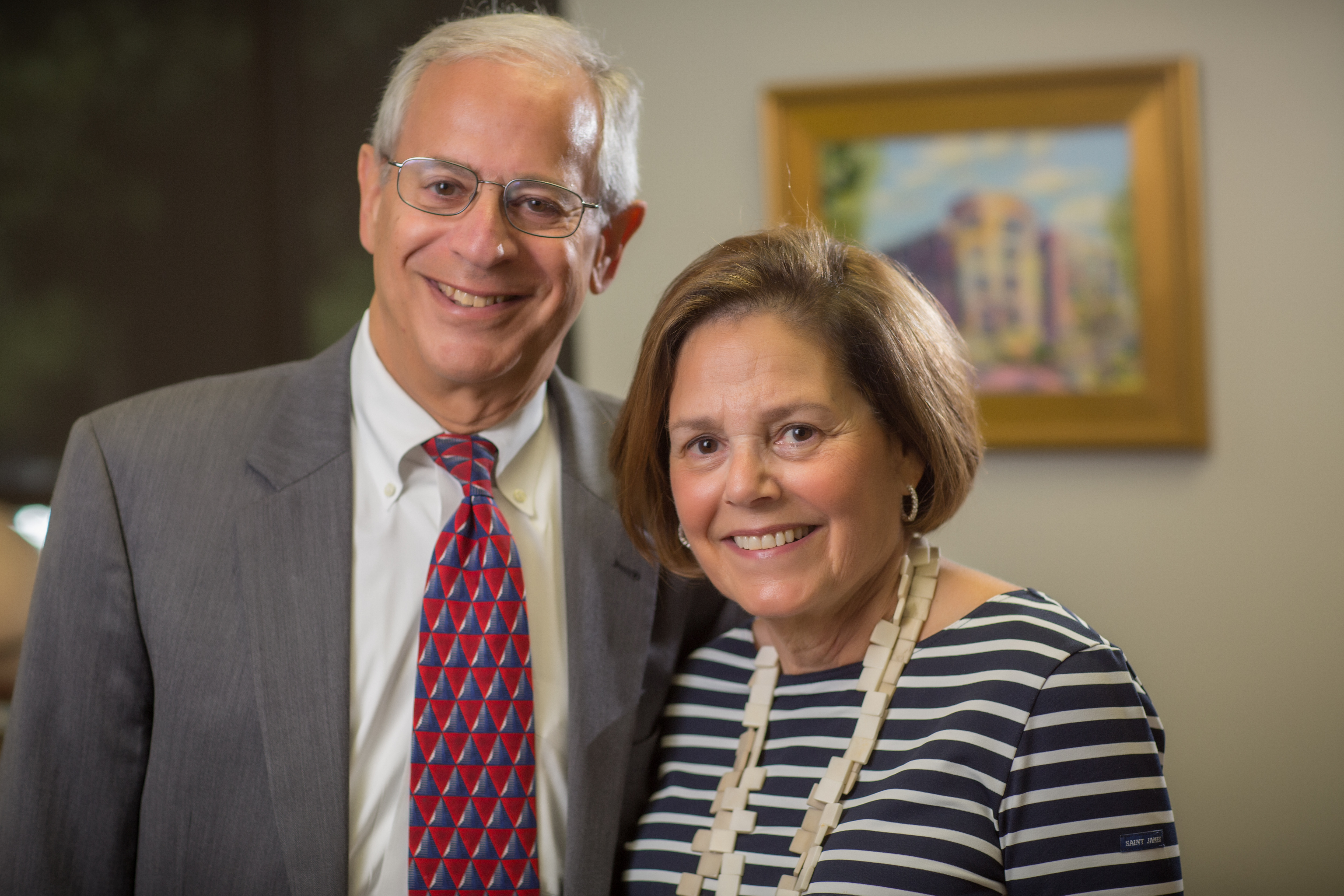Beth Silverstein’s family history of cancer led her to UNC Lineberger’s Cancer Genetics Program. She learned she had a BRCA1 gene mutation that put her at an 80 percent risk of developing breast cancer and a 50 percent risk of ovarian cancer. Though not the news she wanted, she said the information has helped her take control of her health.

According to the National Cancer Institute, inherited genetic mutations play a major role in about 5 to 10 percent of all cancers. At UNC Lineberger, our Cancer Genetics Program provides consultations and risk assessments for people who have a strong, inherited predisposition to having cancer.
The following patient profile features Beth Silverstein, a remarkable young woman who was told that, because of her genetic profile and family history, she had an 80 percent risk of getting breast cancer and a 50 percent risk of getting ovarian cancer. Beth’s parents, John and Leslie Silverstein, serve on UNC Lineberger’s Board of Visitors.
Silverstein find health, hope and freedom at UNC Lineberger
When Beth Silverstein looks into the mirror, it’s easy to see her resemblance to her mother, Leslie Silverstein. However, while the similarities in their outward appearances are obvious, Beth didn’t know if she had inherited her mother’s genetic history that predisposed her to cancer.
“We are of Ashkenazi Jewish decent, an ethnicity with a much higher risk of certain gene mutations that frequently lead to breast and ovarian cancer,” explains Beth. “My grandmother died at age 36 of breast cancer, and my mother was diagnosed with the same disease at age 39. My mom went through genetic testing because so many of our family members had battled various kinds of cancers, and she encouraged me and my sister Amy to be tested as well.”
When Beth’s genetic results came back, she learned she had tested positive for the BRCA1 gene mutation, the same mutation her mother and grandmother had. She was heartbroken.
Next steps and choices
In April 2008, Beth came to UNC to meet with James P. Evans, MD, PhD, a UNC Lineberger member and Bryson Distinguished Professor of Genetics and Medicine, along with Catherine Fine, MS, CGC, a genetic counselor. “We reviewed Beth’s genetic results and mapped out her family history, and we determined that her risk for developing breast cancer was in the upper 80th percentile,” explains Evans. “Catherine and I discussed her options with her, which included having a bilateral mastectomy, or she could choose enhanced surveillance consisting of regular visits to our high-risk breast cancer clinic for periodic breast exams, mammograms and MRI’s.”
But that wasn’t the only difficult decision Beth would have to make. Due to her genetic history, Beth had a 50 percent chance of developing ovarian cancer. During their counseling session, Evans explained to Beth that as she aged, her risk would substantially increase. “As a geneticist, I become very nervous when patients like Beth reach their mid-40s and have not taken preventive measures,” says Evans. “Unfortunately, there are no good modalities for detecting early-stage ovarian cancer; the symptoms are vague at best and often mimic other health issues. Once a woman has the disease, it can be extremely difficult to treat.”
Beth was overwhelmed by the news but decided to approach the situation with a positive attitude. To protect her fertility, she chose to go through egg retrieval and then to have the eggs frozen for later fertilization and implantation. Then in 2014, Beth met with oncologist Carey Anders, MD, and surgical oncologist, David Ollila, MD. After an extensive review of Beth’s case, Ollila recommended she have a bilateral mastectomy. While the recommendation to have a bilateral mastectomy may seem aggressive to some, Ollila says the opposite is true in BRAC gene mutation carriers.
“Surveillance is not the same as prevention. Obtaining annual breast imaging only serves to try to detect the cancer early. It doesn’t prevent the cancer from forming. If Beth had chosen to forgo surgery and decided instead to take a wait-and-see attitude, it’s very likely that at some point in the near future, we would be discussing a cancer diagnosis, followed by surgery, radiation and chemotherapy. And that’s IF we caught it early enough. Beth didn’t make this decision lightly; it was a thoughtful, rational choice, and a wise one, in my professional opinion, supported by concrete genetic evidence.”
On February 3, 2015, Ollila performed Beth’s bilateral mastectomy, and Beth’s reconstruction surgery was completed in the summer of that same year. She also met with Evans and Fine again, this time to review her lab work and to further discuss the surgical removal of her ovaries.
In February 2016, Beth had a salpingo-oophorectomy, which is the removal of the fallopian tubes (salpingectomy) and ovaries (oophorectomy). The two-and-a-half hour surgery went well, but it immediately sent Beth into menopause. She’s now dealing with the after-effects that include hot flashes, insomnia and “foggy brain.” But for Beth, this is the new normal. While the surgeries have changed her, both physically and emotionally, she feels empowered as she enters the next decade of her life.
“Some people ask me why I decided to take, what they perceive to be, such radical steps. I won’t lie, it was hard,” she says. “But the moral of this story is that you need to know your family history, and recognize that genetics affect every generation. I’m not a victim; I took control of my health, making the choices that were right for me. Now I get to live my life without fear of what’s going to happen. That’s liberating.”
Silversteins honor Evans with gift to Lineberger

John and Leslie Silverstein were introduced to UNC Lineberger in 1988, the same year Leslie was treated for stage I breast cancer. “We attended a Lineberger fundraising event, where we heard (former UNC Lineberger director) Shelley Earp, MD, talk about the groundbreaking research taking place at the cancer center,” says Leslie. “We were fascinated, and we joined the Board of Visitors soon after, serving on various committees.”
Then, in 1990, Leslie was diagnosed with stage IV lung cancer. Her lung was removed, and since there was no evidence of any more disease, she was treated with Tamoxifen. She remains cancer-free. Meanwhile, cancer struck the Silverstein family again in 2015, when John was treated for prostate cancer.
“We have experienced cancer in very personal ways, and, of course, our daughter Beth has gone through a series of surgeries to protect herself against the disease,” Leslie explains. “John and I are very grateful for the care our family has received at the N.C. Cancer Hospital, and we wanted to make a gift to express our appreciation. When we considered the incredible work Dr. Jim Evans is doing with genetics and how it has directly affected our family, we chose to make a naming gift in his honor. UNC Lineberger is fortunate to have him on their team.”
